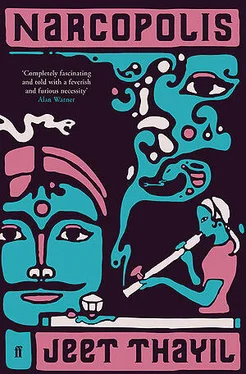The third and last section is the shortest and most problematic in political terms. It concerns the life of a young Muslim named Ma, who is born in a province on the south-western border. The boy is captured by the Ming, castrated, renamed, and made a servant to the prince. He is taken to the imperial court, where he is instructed in the ways of the Sons of Heaven. When the prince becomes emperor he decides to announce his ascension by beginning the sea voyages that have been planned for years but never attempted. He makes the Muslim eunuch (now called Zheng He) the admiral of his fleet and tells him to sail to the end of the horizon, beyond the known earth, to spread the glory of the Ming. The story is told in the third person but for long passages it dips into the head of the admiral, who is not above making political forecasts: ‘The Emperor believes China is the centre of the world and he is the centre of China therefore he is the centre of the world. Try as he might to disguise it, he suffers from the ailment peculiar to Chinese leaders — the delusion that they are the most important form of life in the universe and their struggles and idiosyncrasies are worthy not only of emulation but of reverence.’ But the admiral also composes poems of praise that are craven and banal:
Waves are high, the storm fierce, the sea’s valleys deep;
Preparing to die, brave men rush in every direction
Praying to the goddess. Who will keep them safe?
Who else but a valiant emperor, the great Ming?
The narrator of the third section is a young grand-nephew of Zheng He’s, a boy named Soporo Onar, who sets off to find his illustrious relative’s final resting place. The quest is ultimately unsuccessful and most of the last section is taken up, not by Zheng He’s triumphant early voyages, but by his desperate final one. It ends with his death in India and his burial at sea and Soporo’s decision to build a monument to him in the pages of a book. Where in India did Zheng He die? Somewhere on the west coast, possibly some spot that wasn’t too far from present-day Bombay, said Lee to Dimple, which may have influenced my own decision to live here. Then he said, I wish there was a translation of my father’s book, because if there’s anyone who would benefit from reading about the life of the eunuch admiral, it’s you.
Chapter Five ‘Light me a cigarette’
He told Dimple he had been thirty-eight when his life changed in a way he could never have foreseen. That year, at a banquet in Peking, he found himself seated beside a slender woman whose hair was curled in the new style. She wore a plum-coloured suit with white lapels and she accompanied a navy commissar who chain-smoked unfiltered foreign cigarettes. Early in the evening the commissar switched to brandy and soon he became silent and unexpectedly agile for such a heavy man. He told the waiters to replenish the teapot and the wine and water glasses. He spoke only when giving orders; he didn’t converse with his dinner companions. Then, his elbow slipped off the table and he spilled the slender woman’s wine. A deep stain spread across the tablecloth and the commissar watched in fascination, as if it were the stain of communism itself, the unstoppable stain that had spread across the world and dyed it the colour of blood. The woman — or girl, since he thought she couldn’t have been more than twenty or twenty-one — picked up the glass and placed it beside her untouched plate. She refilled it with a little wine and took a sip. Then she asked Lee to help her with the commissar. They took the man to a room above the banqueting hall, where the girl put him to bed and took off his shoes. He was already asleep. The girl smoothed her skirt over her hips as she regarded the man on the bed. She sighed in an exaggerated way and put her hands on her waist and didn’t look at Lee. She said: The first Ming, Tai Zong, drew up a list of capital offences for government officials that included such things as the formation of cliques and flattery. Public drunkenness too was a capital offence. Do you know what the punishment was? The official was flayed and his skin was stuffed with straw and installed in a government building to serve as a warning to other officials. She sighed once more in a slow, theatrical way and it must have felt good, because she did it again. She said: Light me a cigarette if you’re going to stare like that. Lee did as he was told. She stood in the middle of the room and blew smoke at the ceiling. He thought: Even her silence is expressive, even the inhaling and blowing out of smoke. See how animated she is. Is she an actress? Is it too bold a question to ask? Before he could say anything, she led the way back to the banqueting hall, then, some time afterwards, she left the table and didn’t return. A few days later he saw her wheeling her bicycle into the commissariat compound. She had her hair up in a bun and she was wearing work pyjamas. She looked very different from the girl with the cigarette whose image had taken up residence in his head. He went to her and blurted the truth, that he had brought something for her. She seemed so disoriented that he wondered if she knew who he was. He gave her a carton of cigarettes, half a cooked chicken and some stalks of sugar cane. She looked towards the compound and hesitated for a moment before putting the gifts into a carrier bag on her bicycle. She said, I am twenty-three years of age. I’m not interested in being a kept woman. Thank you for the gifts, she added, speaking so solemnly that he wondered if he had displeased her in some way. He watched as she pushed her bicycle towards the commissariat. Was she telling him to leave her alone? Did she think he wanted to pay her for sex? The idea put a ball of fear in his stomach. Then it occurred to him that she was saying something very different. She didn’t want to be a kept woman: she wanted to be his wife. This idea also filled him with fear. She was a kind of classical Chinese heroine, a prototypical leader, and she wanted to be his wife. It was hard to believe. He had to talk to someone, someone senior whose advice he could trust. The next morning, unrested, he went to the administrative governor of the region, his boss, Wei Kuo-ching. Wei wasn’t alone and Lee asked permission to marry in the presence of his boss’s colleagues. What is the woman’s name? asked his boss. Lee didn’t know. He described her and how they had met. Oh, said the administrative governor, you mean Pang Mei, Commissar Hu’s assistant. The older man clapped Lee on the shoulder and told him to go ahead if that was what he wanted. Then he said, I hope you know there’s no need for such a drastic step.
*
Lee’s quarters were out of the question. There were too many people around at all times and if she was seen coming out of his rooms there would be trouble, an official investigation perhaps, followed by humiliation, punishment, even prison. The only way they could be alone was to meet in his office, late, when there was no one around. He waited nervously until she came and took her to the supplies room, where he had arranged blankets and a pillow behind a desk in the back. He locked the door and turned off the lights and they held each other in the dark, the girl’s slim form like a child’s in his arms. There was some inadequate illumination from the street lights outside, just enough to see her face. She seemed very serious, which only made him more nervous. When she reached for his dick he jumped and when she put it in her mouth he whimpered, he actually whimpered, and then he was ashamed. She took a tube from her purse and smeared a small amount of cream on herself with a single deft gesture. In the ass, she told him. Fuck me in the ass. Then she straddled him and guided him into her and played with her clitoris while she rode him. He came instantly and again he was ashamed. Later, as they lay beside each other, she said: I am taking a precaution. In case we’re caught a medical examination will prove I’m still a virgin. Then Pang Mei turned on her side, curled herself into a small ball and went to sleep. Lee thought he’d let her sleep for half an hour, then wake her and tidy up and get out of the building. If he fell asleep too it could be catastrophic. He propped himself on an elbow to look at her. He thought about the Yellow River’s summer floods and the steamed buns he bought sometimes from the railway terminus. He thought about the horses of Mongolia, about the Tartars’ subjugation of Russia, and about the wise and solitary dragons that live in the heated air above the mountains of Szechwan. The girl’s lips were moving silently in her sleep and he could see her eyes flickering under the lids. He thought about the melancholy dragons of Szechwan and just then a tremor struck the room. The air seemed to shift and the temperature dropped and there wasn’t enough oxygen. A sound of waves or mosquitoes washed against his ears. The floor shook as if a large animal was trapped under the building. Every object in the room, the standing lamp, the desks, the chairs and filing cabinets, everything was shaking. He took a deep breath but couldn’t fill his lungs. He stood up and fell to his knees. When the earthquake stopped he was kneeling on the blankets with his hands clasped around the girl’s ankles, and he knew her as his saviour.
Читать дальше












